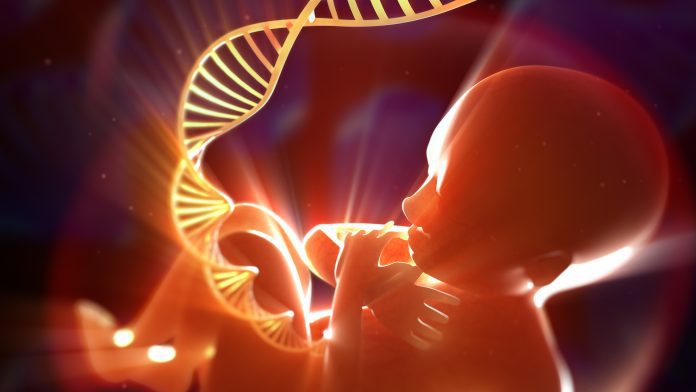
Researchers have identified that an unborn baby can potentially contract COVID-19 infection, uncovering the mechanism behind catching the virus.
A study, led by researchers from the University College London (UCL) with Great Ormond Street Hospital for Children and the NIHR Great Ormond Street Biomedical Research Centre, has illuminated that an unborn baby can become infected with COVID-19 if their gut is exposed to the SARS-CoV-2 virus.
The investigation, published in BJOG, was funded by the Medical Research Council (MRC) and UKRI COVID-19 rapid response initiative.
COVID-19 in unborn babies
The study didn’t specifically examine mothers with COVID-19 and if their infection was transmitted to an unborn baby, but it did identify that specific foetal organs, such as the intestine, are more susceptible to infection than others. Despite this, the experts say that an unborn baby’s chances of being infected with COVID-19 are extremely low. The placenta acts as a protective shield, with evidence demonstrating that foetal infection – called vertical transmission – is incredibly uncommon.
The objective of the team was to ascertain how newborn babies develop COVID-19 antibodies, an occurrence that has been reported in a small number of cases. To accomplish this, the researchers analysed numerous foetal organs and placenta tissue to determine if there was any presence on the cell surface protein receptors, ACE2 and TMPRSS2, which are located on the outside of cells and are required for SARS-Cov-2 infection. Foetal organs and tissues were made available via the Human Developmental Biology Resource (HDBR) biobank.
ACE2 and TMPRSS2
The team discovered that both ACE2 and TMPRSS2 were present in the intestines (gut) and the kidney, although the foetal kidney is anatomically protected from exposure to COVID-19 and is therefore at a lower risk of infection. This enabled the researchers to determine that COVID-19 can only infect a foetus via the gut and through the unborn baby swallowing amniotic fluid, which it does naturally for nutrients.
Following birth, the ACE2 and TMPRSS2 receptors are understood to be present in combination on the surface cells in the human intestine and lung. The primary avenues for COVID-19 infection are believed to be the gut and lung; however, in younger children, the intestine appears to be the most pivotal for virus infection.
Dr Mattia Gerli, the senior author of the study from the UCL Division of Surgery and Interventional Science, said: “The foetus is known to begin swallowing the amniotic fluid in the second half of pregnancy. To cause infection, the SARS-CoV-2 virus would need to be present in significant quantities in the amniotic fluid around the foetus.
“However, many studies in maternity care have found that the amniotic fluid around the foetus does not usually contain the SARS-CoV-2 virus, even if the mother is infected with COVID-19. Our findings, therefore, explain that clinical infection of the foetus during pregnancy is possible but uncommon, and that is reassuring for parents-to-be.”
Professor Paolo De Coppi, the co-senior author of the study from the UCL Great Ormond Street Institute of Child Health and NIHR Great Ormond Street Hospital, commented: “We have shown that the foetal intestine, which is in contact with amniotic fluids swallowed by the baby, is susceptible to SARS-CoV-2 virus. However, the placenta acts as a natural barrier, and with the limited evidence of amniotic fluid containing the virus, our study should provide reassurance to mothers.”
The researchers explained that the most significant risk to the foetus during pregnancy is if the mother becomes extremely ill due to COVID-19 infection. For instance, the virus may be present in high concentrations in the amniotic fluid, damaging the placenta and resulting in preterm birth.
Professor Anna David, a co-author of the research from the UCL Elizabeth Garrett Anderson Institute for Women’s Health and UCLH NIHR Biomedical Research Centre, added: “Vaccination against COVID-19 is known to be safe in pregnancy and reduces the chance of Sars-CoV2 infection to very low levels. The results of this study provide definitive information regarding the susceptibility of the human foetus to COVID-19 infection. Our findings support current healthcare policy that vaccination in pregnancy is the best way for mothers to protect their unborn baby from COVID-19 infection.”
























